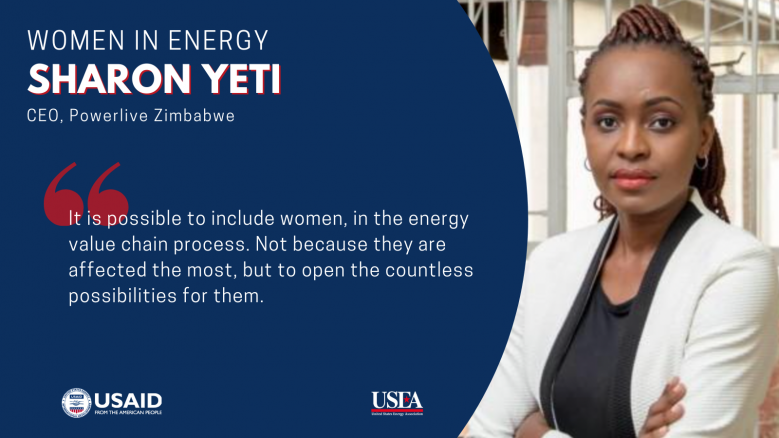
Women in Energy: Sharon Yeti
The Women in Energy series is a joint project between USEA and USAID that was developed out of USEA’s Engendering Industries Partnership, a program funded by USAID to improve gender policies and gender outcomes at their respective organizations.

Every month we feature a woman who has shown exemplary leadership. The women highlighted come from diverse backgrounds and roles, and they bring with them a unique perspective on gender equality within the energy sector.
1. How have both your education and career path led you to where you are now?
My educational background is mostly centered on finance and business management. Working in the finance department didn’t give me a lot of exposure in terms of traveling with work but the few times that I did, had a huge impact in leading me to where I am now. My previous job opportunities have helped me understand the challenges that women on the grass-root level face in terms of energy poverty. I had a chance of participating in the national census in 2012 when I was deployed to the rural areas of Masvingo where I spent 10 days and had the chance of interacting with women and how they lived their lives. Working for a solar energy company helped me understand solar energy and the immense benefits that come with using it. It has helped me understand that it is possible to include women in the energy value chain process; not because they are affected the most, but to open the countless possibilities for them.
2. What obstacles have you experienced as a woman pursuing an education and career in the energy industry? What obstacles do women vying for leadership spots face in this sector?
The first one and a half years after starting Powerlive Zimbabwe were definitely the hardest. I know most startups face challenges, but I think being a woman and trying to convince people of your idea made it even more difficult because no one took me seriously. Getting access to financing was the biggest hurdle because we got more than ten rejections of our proposal. The other issue was the lack of mentorship programs to help guide me through the different processes and challenges as a women-led startup. It is easier learning from a woman because our challenges are more or less the same, men empathize but they wouldn’t really understand what you will be going through. The lack of policies not providing for gender-based efforts made it difficult too.
Sometimes government programs do not account sufficiently for the root causes contributing to the lack of women’s participation and employment in the industrial sector and their non-representation in highly skilled positions.
3. Technology is transforming the traditional utility business model into a more modern interactive grid. Some utilities view this transformation as an opportunity to focus on innovation and diversity, which research has shown to drive better business performance. How is your organization attracting, retaining, and promoting more women into senior management positions to respond to this industry transformation? Is company data on this publicly available?
The coming in of distributable solar energy solutions has ushered in new opportunities for women in different management positions in response to various needs in the value chain. Senior positions in general management, data analysis, finance, and human development to align institutions toward the distributable energy business model.
4. What changes in the sector at large do you think have launched more women into leadership positions?
There are more mentorship programs for women-by-women which really helps a lot and there has been an increase in advocacy for funding for women-led institutions which has increased the number of women stepping forward with confidence.
5. What are some untapped actions the energy and electricity sector could focus on to accelerate change, increase diversity, and foster a better gender balance in the boardroom?
Zimbabwe's renewable energy policy is silent on matters dealing with gender yet its common course that access to energy affects men and women differently. There should be policy alignment toward the different effects energy access has on gender. Fair presentation is required at every part of the value chain, to make sure a clear understanding of gender energy requirements.
